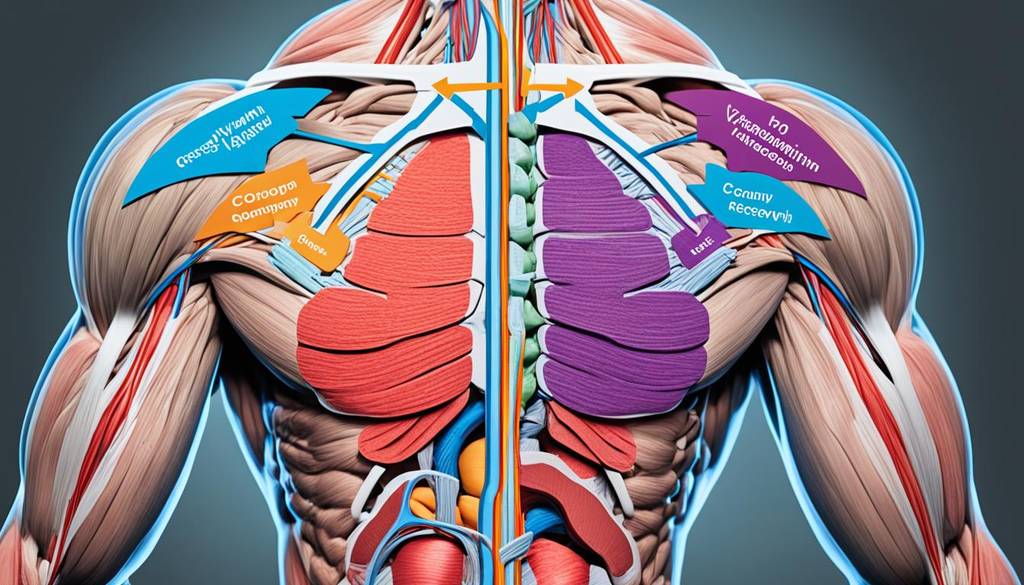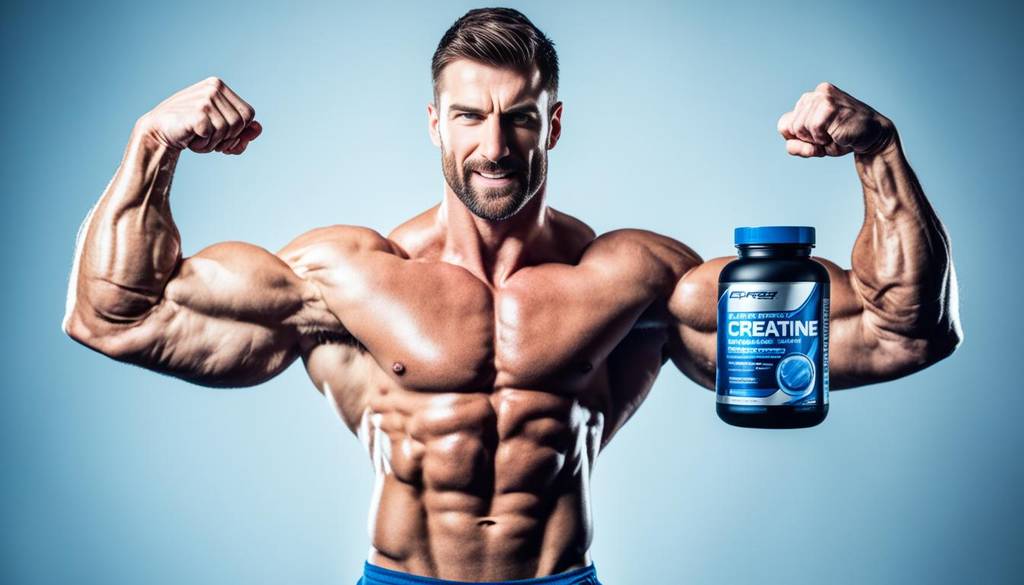Do you struggle with muscle weakness and want to find effective ways to recover and regain your strength? We’ve got you covered. When it comes to overcoming muscle weakness, providing your body with the right vitamins is essential. These nutrients play a crucial role in muscle repair, strength, and overall function. By understanding the importance of these vitamins and ensuring optimal levels, you can promote muscle rejuvenation and overcome weakness more effectively.
In this article, we will delve into the key vitamins that are vital for muscle weakness recovery. From the best supplements to natural remedies and nutrient-rich foods, we will explore the strategies that can support your journey towards muscle strength and vitality. So, let’s dive in and discover the power of vitamins in the fight against muscle weakness!
The Role of Protein in Muscle Repair and Strength
Protein is a key component in muscle repair and strength. It plays a vital role in the growth and repair of muscle tissues, making it essential for recovering from muscle weakness. When it comes to muscle healing, understanding how protein supports the process is crucial.
Understanding How Protein Supports Muscle Healing
Protein is composed of amino acids, which are the building blocks of muscle. When you consume protein-rich foods, your body breaks them down into amino acids, which are then used to repair and build muscle tissues. This process helps facilitate the healing of damaged muscles and accelerates recovery from muscle weakness.
Optimal Sources of Protein for Recovery
Choosing the right sources of protein is important for maximizing muscle recovery. Protein-rich foods such as lean meats, poultry, fish, eggs, dairy products, and legumes provide high-quality protein that is rich in essential amino acids. Including these foods in your diet ensures that you have a sufficient supply of protein for muscle repair and strength.
Timing Protein Intake for Maximized Muscle Rejuvenation
The timing of protein intake also plays a role in maximizing muscle rejuvenation. Consuming protein shortly after exercise can enhance muscle protein synthesis, which is the process by which the body builds new muscle proteins. Aim to consume a protein-rich meal or snack within the first hour after exercise to provide your muscles with the necessary fuel for repair and recovery.
Incorporating protein into your post-workout routine can promote muscle strength and vitality, aiding in the recovery from muscle weakness. By understanding the role of protein in muscle repair, consuming optimal sources of protein, and timing your protein intake appropriately, you can support the rejuvenation of your muscles and improve overall muscle strength.
Natural Anti-Inflammatory Foods and Omega-3 for Recovery
Inflammation is often a common factor in muscle weakness and can hinder the recovery process. To promote faster recovery and reduce inflammation, incorporating natural anti-inflammatory foods and omega-3 fatty acids into your diet is highly beneficial.
Anti-inflammatory foods contain compounds that help reduce inflammation in the body, allowing for a more efficient healing process. Examples of anti-inflammatory foods include:
- Turmeric: Known for its active compound curcumin, which has strong anti-inflammatory properties.
- Ginger: Contains gingerol, a potent anti-inflammatory compound that helps ease muscle soreness and reduce swelling.
- Berries: Packed with antioxidants and phytochemicals that combat inflammation and promote recovery.
- Fatty fish: Rich in omega-3 fatty acids, which have powerful anti-inflammatory effects.
- Leafy greens: Spinach, kale, and other leafy greens are high in antioxidants and anti-inflammatory compounds.
Omega-3 fatty acids are essential fats that play a crucial role in muscle repair. They help reduce inflammation and promote recovery by supporting muscle strength and vitality. Foods rich in omega-3 fatty acids include fatty fish like salmon, sardines, and mackerel, as well as walnuts, chia seeds, and flaxseeds.
By incorporating these anti-inflammatory foods and omega-3 fatty acids into your diet, you can reduce inflammation, promote faster recovery, and improve muscle strength. They provide natural remedies for muscle weakness and support the overall healing process.
Vitamins and Minerals that Support Muscle Function
When it comes to supporting muscle function and overall muscle health, several vitamins and minerals play a crucial role. These nutrients provide the necessary building blocks for optimal muscle strength and vitality. In this section, we will explore the specific benefits of key vitamins and minerals for muscle function and their importance in promoting muscle strength and overall well-being.
Vitamin C: Collagen Production and Inflammation Reduction

Vitamin C is not only known for its immune-boosting properties, but it also plays a vital role in supporting muscle function. This essential vitamin aids in collagen production, which is necessary for maintaining the integrity of muscle tissues. Additionally, vitamin C acts as a powerful antioxidant, helping to reduce inflammation and protect muscle cells from damage caused by free radicals.
Zinc’s Impact on Protein Synthesis and Wound Healing
Zinc is a mineral that is crucial for protein synthesis, a process vital for muscle repair and growth. It plays a key role in converting the amino acids obtained from protein into the building blocks needed for muscle tissue regeneration. Moreover, zinc is involved in wound healing, supporting the recovery process after muscle injury or strain.
Calcium and Vitamin D: The Duo for Bone and Muscle Health
Calcium and vitamin D work together synergistically to support not only bone health but also muscle function. Calcium is essential for muscle contraction, while vitamin D helps regulate calcium absorption in the body. By ensuring adequate levels of both nutrients, you can promote strong bones and healthy muscles, reducing the risk of muscle weakness and related injuries.
By incorporating these vitamins and minerals into your diet, you can provide essential support for your muscles, enhancing their function, strength, and vitality. Whether through a balanced diet or supplements, ensuring optimal levels of these nutrients is crucial for maintaining muscle health and overcoming weakness.
| Vitamin/Mineral | Role in Muscle Function | Food Sources |
|---|---|---|
| Vitamin C | Promotes collagen production, reduces inflammation | Citrus fruits, strawberries, bell peppers |
| Zinc | Supports protein synthesis, enhances wound healing | Lean meats, shellfish, legumes |
| Calcium | Essential for muscle contraction | Dairy products, leafy greens, fortified foods |
| Vitamin D | Aids calcium absorption, promotes bone and muscle health | Sunlight, fatty fish, fortified dairy products |
Vitamins for Muscle Weakness: Identifying Deficiencies
Muscle weakness can sometimes be a result of vitamin deficiencies. Identifying these deficiencies is crucial in understanding and resolving muscle weakness. By addressing vitamin deficiencies, you can effectively improve muscle strength and overcome weakness.

When it comes to identifying vitamin deficiencies that may contribute to muscle weakness, it’s important to pay attention to the symptoms. Some common symptoms of vitamin deficiency that can lead to muscle weakness include:
- Fatigue and weakness
- Muscle cramps and spasms
- Difficulty in muscle coordination
- Reduced muscle strength
- Delayed muscle recovery after exercise
If you are experiencing these symptoms, it is recommended to consult a healthcare professional for a proper diagnosis. They may perform tests to determine your vitamin levels and identify any deficiencies that could be contributing to your muscle weakness.
Once your vitamin deficiencies are diagnosed, your healthcare provider can recommend the appropriate vitamins to address the deficiency. These vitamins can help improve muscle strength and promote overall muscle health. Some vitamins that are commonly recommended for muscle weakness and promoting muscle strength include:
| Vitamin | Role in Muscle Strength |
|---|---|
| Vitamin D | Supports calcium absorption, essential for muscle function and strength |
| Vitamin B12 | Plays a key role in nerve function and muscle strength |
| Vitamin C | Aids in collagen production and supports muscle tissue repair |
| Vitamin E | Acts as an antioxidant, protecting muscle cells from damage and promoting muscle strength |
By addressing vitamin deficiencies and incorporating these essential vitamins into your diet or through supplementation, you can support muscle strength and overcome muscle weakness. Remember to consult with a healthcare professional for personalized guidance based on your specific vitamin needs and overall health condition.
Antioxidants: Combating Oxidative Stress in Muscle Tissues
Oxidative stress is a common factor that contributes to muscle weakness and can hinder the recovery process. However, incorporating antioxidants into your diet can play a crucial role in combating oxidative stress and supporting muscle recovery.

How Antioxidants Contribute to Muscle Recovery
Antioxidants are compounds that help protect cells from the damaging effects of oxidative stress. When our bodies undergo strenuous exercise or experience muscle weakness, oxidative stress can lead to inflammation and damage in the muscle tissues.
By consuming antioxidants, we can neutralize free radicals and reduce inflammation in the muscle tissues. This not only aids in the repair and recovery of damaged muscle fibers but also promotes overall muscle strength and vitality.
Rich Dietary Sources of Antioxidants for Athletes
There are various dietary sources of antioxidants that athletes can incorporate into their diet to support muscle recovery and combat muscle weakness. These dietary sources include:
- Blueberries
- Spinach
- Kale
- Broccoli
- Dark chocolate
- Green tea
- Nuts, such as almonds and walnuts
- Oranges and citrus fruits
These antioxidant-rich foods provide a wide range of vitamins, minerals, and phytochemicals that have been shown to combat oxidative stress and promote muscle rejuvenation.
By incorporating these rich dietary sources of antioxidants into your daily meals and snacks, you can provide your body with the necessary nutrients to support muscle recovery and combat muscle weakness.
Supplementing Creatine for Enhanced Muscle Recovery
When it comes to enhancing muscle recovery, one popular supplement that has gained significant attention is creatine. Creatine is well-known for its potential to provide additional energy to the muscles, leading to improved exercise performance and faster recovery.
Individuals experiencing muscle weakness can benefit from supplementing with creatine. This powerful compound aids in muscle repair and strength, allowing for a more efficient recovery process. By incorporating creatine supplementation into your routine, you can enhance muscle recovery and promote optimal muscle health.

Creatine works by increasing the availability of phosphocreatine, a molecule that plays a crucial role in replenishing adenosine triphosphate (ATP), the primary source of energy for muscle contractions. By replenishing ATP stores more rapidly, creatine supplementation can promote quicker recovery, enabling you to perform at your best during workouts.
Furthermore, creatine has been found to enhance muscle strength by increasing muscle mass and promoting muscle protein synthesis. This not only improves overall muscle vitality but also aids in the repair of damaged muscle tissues, reducing the risk of future muscle weakness or injuries.
To reap the benefits of creatine supplementation, it is important to follow proper dosage guidelines and consult with a healthcare professional, especially if you have any underlying medical conditions.
In conclusion, creatine supplementation can be a valuable addition to your muscle recovery routine. By providing additional energy to the muscles and supporting muscle repair and strength, creatine enhances overall muscle recovery and contributes to improved muscle vitality. Consider incorporating creatine into your supplement regimen after consulting with a healthcare professional to optimize your muscle recovery and achieve your fitness goals.
Fueling Up: Energy Metabolism and B-Complex Vitamins
When it comes to overcoming muscle weakness and improving muscle strength, fueling up with the right nutrients is essential. Energy metabolism plays a crucial role in supporting muscle function and recovery. One group of vitamins that are particularly important for energy production and cell repair are B-complex vitamins.
B-Vitamins and Their Role in Energy and Repair
B-vitamins, including B1 (thiamine), B2 (riboflavin), B3 (niacin), B5 (pantothenic acid), B6 (pyridoxine), B7 (biotin), B9 (folate), and B12 (cobalamin), are involved in various biochemical reactions that contribute to energy metabolism. These vitamins help convert the food we eat into the energy needed for muscle contractions and other physiological processes. They also play a crucial role in the repair and maintenance of cells, including muscle cells.
For example, B1, B2, B3, and B6 are necessary for the conversion of carbohydrates into usable energy. B5 is involved in the synthesis of coenzyme A, a molecule that participates in several metabolic pathways. B7 is important for the metabolism of fatty acids, while B9 and B12 are involved in the production of red blood cells and DNA synthesis.
Ensuring an adequate intake of B-vitamins is crucial for optimal energy production and cellular repair, which are essential for overcoming muscle weakness and promoting muscle strength.
The Synergistic Effects of B-Complex Vitamins on Muscle Health
One of the unique aspects of B-complex vitamins is their synergistic effects. This means that they work together to enhance their individual functions and provide additional benefits when combined.
For example, B6 and B12 are involved in the production of red blood cells, which carry oxygen to the muscles. Adequate oxygen supply is crucial for optimal muscle functioning and performance. Additionally, B6 and B12 play a role in the synthesis of neurotransmitters, such as serotonin and dopamine, which are involved in muscle coordination and overall mood.
B-complex vitamins also support the health of nerves that control muscle function. B1, B6, and B12, in particular, are important for nerve health and the transmission of signals between nerves and muscles. By promoting optimal nerve function, these vitamins contribute to improved muscle strength and coordination.
By understanding the importance of B-complex vitamins for muscle repair and their role in energy metabolism, you can ensure that your body has the necessary nutrients to support muscle health. Incorporating B-vitamin-rich foods into your diet or considering supplements, under the guidance of a healthcare professional, can help you overcome muscle weakness and improve muscle strength.

Conclusion
In conclusion, essential vitamins are key to the recovery of muscle weakness. By understanding the role of these vitamins and ensuring optimal levels, we can promote the rejuvenation of our muscles and overcome weakness more effectively. Incorporating natural anti-inflammatory foods, omega-3 fatty acids, and antioxidants into our diet can further aid in reducing inflammation, combating oxidative stress, and supporting overall muscle recovery.
Supplementing with creatine and ensuring proper energy metabolism through B-complex vitamins can also enhance muscle recovery and strength. By incorporating these strategies and nutrients into our routine, we can successfully overcome muscle weakness and promote optimal muscle health.
When it comes to promoting muscle strength, it’s important to remember that it is a holistic process. Alongside vitamins and supplements, it is essential to incorporate other muscle recovery tips and remedies into our lifestyle. This includes proper rest and sleep, regular exercise, and maintaining a healthy overall diet.
By following these guidelines and taking a proactive approach to muscle recovery, we can reap the benefits of improved muscle strength, overcome weakness, and regain our vitality.
FAQ
What vitamins are essential for muscle weakness recovery?
How does protein support muscle healing?
What are the optimal sources of protein for muscle recovery?
When is the best time to intake protein for muscle rejuvenation?
What are natural anti-inflammatory foods and how do they aid in muscle recovery?
How do omega-3 fatty acids contribute to muscle weakness recovery?
What is the role of vitamin C in muscle function?
How does zinc impact muscle repair?
Why are calcium and vitamin D important for muscle health?
How are vitamin deficiencies connected to muscle weakness?
What are the symptoms of vitamin deficiencies that can cause muscle weakness?
How can antioxidants combat oxidative stress in muscle tissues?
What are rich dietary sources of antioxidants for athletes?
How does creatine supplementation enhance muscle recovery?
What role do B-complex vitamins play in energy metabolism and muscle health?
Source Links
- https://www.healthline.com/nutrition/foods-supplements-for-sports-injury
- https://mobileivnurses.com/blog/top-8-vitamins-and-supplements-for-muscle-recovery/
- https://www.ncbi.nlm.nih.gov/pmc/articles/PMC9230724/




